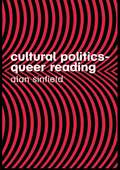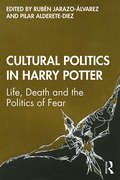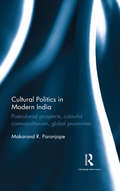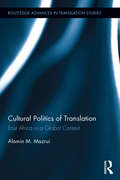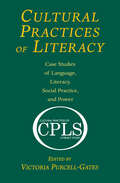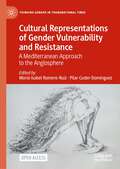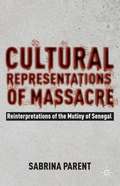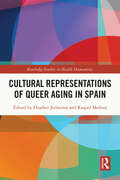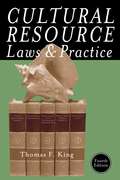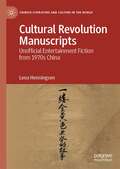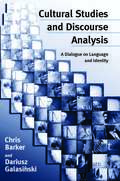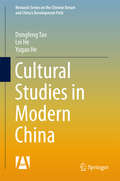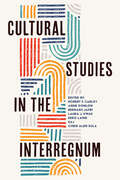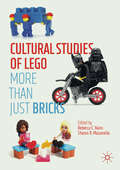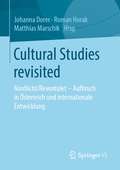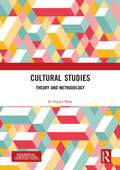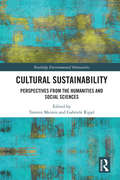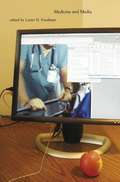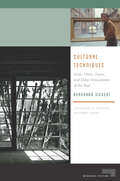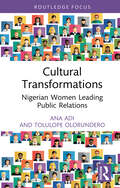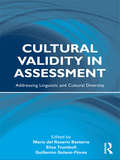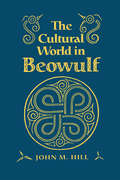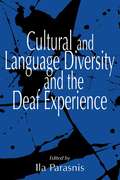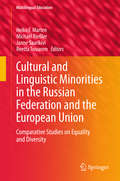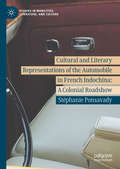- Table View
- List View
Cultural Politics - Queer Reading (New Cultural Studies)
by Alan SinfieldFollowing a first edition that generated wide-spread debate, Cultural Politics – Queer Reading is a bold study of the future of critical theory and the role of gender, ethnicity and cultures within academic literary studies.An illuminating introduction to the second edition revisits the book's agenda for a new form of cultural critique and a truly political lesbian and gay studies. Sinfield renews his call for an 'Englit' that incorporates ongoing study of the cultures of ethnicity, gender and sexuality.Challenging the assumptions that have shaped the study of English literature, Sinfield engages provocatively with topics such as the gendering of literary culture, the sexual politics of psychoanalysis during the Cold War and the history of cultural materialism. He discusses such key figures as William Shakespeare, Christopher Marlowe, Walt Whitman, Arthur Miller, Holly Hughes, Audre Lorde and Jeanette Winterson.This influential investigation of the principles and practice that may form dissident reading, forms compelling argument for intellectual allegiances beyond the academy.
Cultural Politics in Harry Potter: Life, Death and the Politics of Fear
by Rubén Jarazo-Álvarez Pilar Alderete-DiezCultural Politics in Harry Potter: Life, Death and the Politics of Fear is the first book-length analysis of topics, such as death, fear and biopolitics in J.K. Rowling’s work from controversial and interdisciplinary perspectives. This collection brings together recent theoretical and applied cultural studies and focuses on three key areas of inquiry: (1) wizarding biopolitics and intersected discourses; (2) anxiety, death, resilience and trauma; and (3) the politics of fear and postmodern transformations. As such, this book: provides a comprehensive overview of national and gender discourses, as well as the transiting bodies in-between, in relation to the Harry Potter books series and related multimedia franchise; situates the transformative power of death within the fandom, transmedia and film depictions of the Potterverse and critically deconstructs the processes of subjectivation and legitimation of death and fear; examines the strategies and mechanisms through which cultural and political processes are managed, as well as reminding us how fiction and reality intersect at junctions, such as terrorism, homonationalism, materialism, capitalism, posthumanism and technology. Exploring precisely what is cultural about wizarding politics, and what is political about culture, this book is key reading for students of contemporary literature, media and culture, as well as anyone with an interest in the fictional universe and wizarding world of Harry Potter.
Cultural Politics in Modern India: Postcolonial prospects, colourful cosmopolitanism, global proximities
by Makarand R. ParanjapeIndia’s global proximities derive in good measure from its struggle against British imperialism. In its efforts to become a nation, India turned modern in its own unusual way. At the heart of this metamorphosis was a "colourful cosmopolitanism," the unique manner in which India made the world its neighbourhood. The most creative thinkers and leaders of that period reimagined diverse horizons. They collaborated not only in widespread anti-colonial struggles but also in articulating the vision of alter-globalization, universalism, and cosmopolitanism. This book, in revealing this dimension, offers new and original interpretations of figures such as Kant, Tagore, Heidegger, Gandhi, Aurobindo, Gebser, Kosambi, Narayan, Ezekiel, and Spivak. It also analyses cultural and aesthetic phenomena, from the rasa theory to Bollywood cinema, explaining how Indian ideas, texts, and cultural expressions interacted with a wider world and contributed to the making of modern India.
Cultural Politics of Translation: East Africa in a Global Context (Routledge Advances in Translation and Interpreting Studies)
by Alamin M. MazruiThis book is the first full-length examination of the cultural politics at work in the act of translation in East Africa, providing close critical analyses of a variety of texts that demonstrate the myriad connections between translation and larger socio-political forces. Looking specifically at texts translated into Swahili, the book builds on the notion that translation is not just a linguistic process, but also a complex interaction between culture, history, and politics, and charts this evolution of the translation process in East Africa from the pre-colonial to colonial to post-colonial periods. It uses textual examples, including the Bible, the Qur’an, and Frantz Fanon’s Wretched of the Earth, from five different domains – religious, political, legal, journalistic, and literary – and grounds them in their specific socio-political and historical contexts to highlight the importance of context in the translation process and to unpack the complex relationships between both global and local forces that infuse these translated texts with an identity all their own. This book provides a comprehensive portrait of the multivalent nature of the act of translation in the East African experience and serves as a key resource for students and researchers in translation studies, cultural studies, post-colonial studies, African studies, and comparative literature.
Cultural Practices of Literacy: Case Studies of Language, Literacy, Social Practice, and Power
by Victoria Purcell-GatesThis volume presents case studies of literacy practices as shaped by culture, language, community, and power. Covering a range of contexts and exploring a number of relevant dimensions in the evolving picture of literacy as situated, multiple, and social, the studies are grouped around four overarching themes:*Language, Literacy, and Hegemony;*The Immigrant Experience: Language, Literacies, and Identities;*Literacies In-/Out-of-School and On the Borders; and*New Pedagogies for New Literacies. It is now generally recognized that literacy is multiple and woven within the sociocultural lives of communities, but what is not yet fully understood is how it is multiple--how this multiplicity plays out across and within differing sociocultural contexts. Such understanding is critical for crafting school literacy practices in response to the different literacy sets brought to school by different learners. Toward this end it is necessary to know what those sets are composed of. Each of the case studies contributes to building this knowledge in new and interesting ways. As a whole the book provides a rich and complex portrait of literacy-in-use. Cultural Practices of Literacy: Case Studies of Language, Literacy, Social Practice, and Power advances sociocultural research and theory pertaining to literacy development as it occurs across school and community boundaries and cultural contexts and in and out of school. It is intended for researchers, students, professionals across the field of literacy studies and schooling, including specialists in family literacy, community literacy, adult literacy, critical language studies, multiliteracies, youth literacy, international education, English as a second language, language and social policy, and global literacy.
Cultural Representations of Gender Vulnerability and Resistance: A Mediterranean Approach to the Anglosphere (Thinking Gender in Transnational Times)
by Maria Isabel Romero-Ruiz Pilar Cuder-DomínguezThis Open Access book considers the cultural representation of gender violence, vulnerability and resistance with a focus on the transnational dimension of our contemporary visual and literary cultures in English. Contributors address concepts such as vulnerability, resilience, precarity and resistance in the Anglophone world through an analysis of memoirs, films, TV series, and crime and literary fiction across India, Ireland, Canada, Australia, the US, and the UK. Chapters explore literary and media displays of precarious conditions to examine whether these are exacerbated when intersecting with gender and ethnic identities, thus resulting in structural forms of vulnerability that generate and justify oppression, as well as forms of individual or collective resistance and/or resilience. Substantial insights are drawn from Animal Studies, Critical Race Studies, Human Rights Studies, Post-Humanism and Postcolonialism. This book will be of interest to scholars in Gender Studies, Media Studies, Sociology, Culture, Literature and History.Grant FFI2017-84555-C2-1-P (research Project “Bodies in Transit: Genders, Mobilities, Interdependencies”) funded by MCIN/AEI/ 10.13039/501100011033 and by “ERDF A way of making Europe.”
Cultural Representations of Massacre
by Sabrina ParentIn this book, Parent puts together a history of representations of the 1944 mutiny in Senegal. Combining firsthand analysis of the works and their intertextual interactions as well an external perspective, Parent engages with history, literature, film, poetics, and politics and highlights the importance of remembering the past.
Cultural Representations of Queer Aging in Spain (Routledge Studies in Health Humanities)
by Raquel MedinaThis collection examines representations of Spanish queer aging through investigations of literary and cinematic representations of this demographic, offering a showcase for research on communities often made invisible due to age and sexual identity in Spanish culture with wider implications for queer aging studies research.The volume builds on theoretical foundations established by queer aging studies scholars and the ways in which queer aging differs from heterosexual aging, examining negative topics that arise in literature and film (such as the AIDS crisis, the silencing of queer aging individuals, and social stigmas against this group), in addition to positive topics (like the creation of communities and spaces for queer aging characters). Chapters are structured in conversation with one another about key themes in depictions of queer aging in Spanish culture. Several chapters examine such topics as the aging body, stereotypes and discrimination, old age tropes, and queer invisibility, while others highlight positive representations in exploring the importance of the connection to home, family, and community spaces for queer communities. The collection represents a critical step in future work on queer aging to take future research beyond the Spanish context to extend to new geographic and disciplinary borders.This book will be of interest to scholars in aging studies, gerontology studies, queer theory, health humanities, and Spanish literature and culture.
Cultural Resource Laws and Practice (Heritage Resource Management Series) (Fourth Edition)
by Thomas F. KingIn this fourth edition of the CRM classic, Thomas F. King shares his expertise in dealing with laws regulating the use of cultural resources. He explains the various federal, state, and local laws governing the protection of resources, how they have been interpreted, how they operate in practice, and even how they are sometimes in contradiction with each other.
Cultural Revolution Manuscripts: Unofficial Entertainment Fiction from 1970s China (Chinese Literature and Culture in the World)
by Lena HenningsenThis book investigates handwritten entertainment fiction (shouchaoben wenxue) which circulated clandestinely during the Chinese Cultural Revolution. Lena Henningsen’s analyses of exemplary stories and their variation across different manuscript copies brings to light the creativity of these readers-turned-copyists. Through copying, readers modified the stories and became secondary authors who reflected on the realities of the Cultural Revolution. Through an enquiry into actual reading practices as mapped in autobiographical accounts and into intertextual references within the stories, the book also positions manuscript fiction within the larger reading cosmos of the long 1970s. Henningsen analyzes the production, circulation and consumption of these texts, considering continuities across the alleged divide of the end of the Mao-era and the beginning of the reform period. The book further reveals how these texts achieved fruitful afterlives as re-published bestsellers or as adaptations into comic books or movies, continuing to shape the minds of their audience and the imaginations of the past.Chapter 5 is available open access under a Creative Commons Attribution 4.0 International License via link.springer.com.
Cultural Studies and Discourse Analysis: A Dialogue on Language and Identity (Cultural Studies)
by Chris Barker Dariusz Galasi SkiThis novel and important book brings together insights from cultural studies and critical discourse analysis to examine the fruitful links between the two. Cultural Studies and Discourse Analysis shows that critical discourse analysis is able to provide the analytic context, skills and tools by which we can study how language constructs, constitutes and shapes the social world and demonstrates in detail how the methodological approach of critical discourse analysis can enhance cultural studies. In a richly argued discussion, the authors show how marrying the methodology of critical discourse analysis with cultural studies enlarges our understanding of gender and ethnicity.
Cultural Studies in Modern China (Research Series on the Chinese Dream and China’s Development Path)
by Dongfeng Tao Lei He Yugao HeAs the first book to introduce and analyze cultural studies in contemporary China, this volume is an important resource for Western scholars wishing to understand the rise and development of cultural studies in China. Organized according to subject, it includes extensive material examining the relationships between culture and politics, as well as culture and institutions in contemporary China. Further, it discusses the development of cultural debates.
Cultural Studies in the Interregnum
by Eero Laine Robert F. Carley Beenash Jafri Anne Donlon Laura J. Kwak Saj Chris Alen SulaThe editors and contributors to Cultural Studies in the Interregnum mobilize transnational cultural studies as a tool for politically engaged intellectual critique. Alongside the work of emerging and established scholars and activists, they think through massive cultural shifts and explore the possibilities of the in-between. Covering queer and feminist studies, critical disability studies, and critical race and ethnic studies, the essays in Cultural Studies in the Interregnum reflect on our shared political pasts and futures. Using examples ranging from media and literature to sex work, policing, and university systems, this exciting volume probes what cultural studies means in moments of social transformation. Contributors include: Sean Johnson Andrews, C.M. Kaliko Baker, Mary Tuti Baker, James Bliss, Jorge E. Cuéllar, John R. Decker, Brian Dolber, Candace Fujikane, Evyn Lê Espiritu Gandhi, Chris Hall, Rachel Lim, Alexis Pauline Gumbs, Anna Karthika, Manu Karuka, Najwa Mayer, Kyle Mays, Andrew Ó Baoill, Yumi Pak, Therí A. Pickens, Sami Schalk, Leanne Betasamosake Simpson, Tia Trafford, and the editors
Cultural Studies of LEGO: More Than Just Bricks
by Rebecca C. Hains Sharon R. MazzarellaThis collection examines LEGO from an array of critical and cultural studies approaches, foregrounding the world-renowned brand's ideological power and influence. Given LEGO’s status as the world’s largest toy manufacturer and a transnational multimedia conglomerate, Cultural Studies of Lego: More Than Just Bricks considers LEGO media's cultural messages; creativity with and within LEGO artifacts; and diversity within the franchise, including gender and race representation. The chapters’ in-depth analyses of topics including LEGO films, marketing tactics, play sets, novelizations, and fans offer compelling insights relevant to those interested in the LEGO brand and broader trends in the children’s popular culture market alike.
Cultural Studies revisited: Nordlicht/Revontulet - Aufbruch in Österreich und internationale Entwicklung
by Roman Horak Johanna Dorer Matthias MarschikDieses Buch präsentiert Cultural Studies, beginnend mit der österreichischen Aufbruchsstimmung und begleitet von internationalen Stimmen der Tagungsteilnehmer*innen in Tampere und Birmingham. Es zeigt die vielfältige Forschungswelt der Cultural Studies bis heute und schlägt Brücken in die Zukunft.Cultural Studies waren ein Versprechen und vielleicht auch eine wissenschaftliche Verheißung. Im wahrsten Wortsinn erschienen sie, als in Finnland die ersten internationalen Tagungen stattfanden, wie ein Nordlicht am Horizont: Revontulet. Die Crossroads-Konferenzen in Tampere (1996, 1998) und Birmingham (2000) waren für Wissenschaftler*innen der Beginn eines interventionistischen Wissenschaftsprojekts, das in Wien seinen Ursprung im Institut für Kulturstudien (IKUS) hatte.
Cultural Studies: Theory and Methodology
by K Sripad BhatCultural Studies, which has emerged as one of the most seminal and intellectual discourses of our times, occupies a strategic location intersecting humanities and social sciences. This book covers the various models of cultural studies prevalent across the globe today and serves as a guide for its theory and practice. It discusses its trajectory and growth as a discipline since the 1960s and analyses various core concepts like popular culture, multiculturalism, identity politics, race, gender, ideology, and hegemony. The subject matter of this book also includes: Roland Barthes: Myth as Culture Blue cultural studies Agency and structure The Reality behind ‘Reality’ TV Shows James Bond: The Popular Hero Print edition not for sale in South Asia (India, Sri Lanka, Nepal, Bangladesh, Pakistan and Bhutan)
Cultural Sustainability: Perspectives from the Humanities and Social Sciences (Routledge Environmental Humanities)
by Gabriele Rippl Torsten MeireisIf the political and social benchmarks of sustainability and sustainable development are to be met, ignoring the role of the humanities and social, cultural and ethical values is highly problematic. People’s worldviews, beliefs and principles have an immediate impact on how they act and should be studied as cultural dimensions of sustainability. Collating contributions from internationally renowned theoreticians of culture and leading researchers working in the humanities and social sciences, this volume presents an in-depth, interdisciplinary discussion of the concept of cultural sustainability and the public visibility of such research. Beginning with a discussion of the concept of cultural sustainability, it goes on to explore its interaction with philosophy, theology, sociology, economics, arts and literature. In doing so, the book develops a much needed concept of ‘culture’ that can be adapted to various disciplines and applied to research on sustainability. Addressing an important gap in sustainability research, this book will be of great interest to academics and students of sustainability and sustainable development, as well as those studying sustainability within the humanities and social sciences, such as cultural studies, ethics, theology, sociology, literature and history.
Cultural Sutures: Medicine and Media
by Lester D. FriedmanMedicine and the media exist in a unique symbiosis. Increasingly, health-care consumers turn to media sources--from news reports to Web sites to tv shows--for information about diseases, treatments, pharmacology, and important health issues. And just as the media scour the medical terrain for news stories and plot lines, those in the health-care industry use the media to publicize legitimate stories and advance particular agendas. The essays in Cultural Sutures delineate this deeply collaborative process by scrutinizing a broad range of interconnections between medicine and the media in print journalism, advertisements, fiction films, television shows, documentaries, and computer technology. In this volume, scholars of cinema studies, philosophy, English, sociology, health-care education, women's studies, bioethics, and other fields demonstrate how the world of medicine engages and permeates the media that surround us. Whether examining the press coverage of the Jack Kevorkian-euthanasia controversy; pondering questions about accessibility, accountability, and professionalism raised by such films as Awakenings, The Doctor, and Lorenzo's Oil; analyzing the depiction of doctors, patients, and medicine on E. R. and Chicago Hope; or considering the ways in which digital technologies have redefined the medical body, these essays are consistently illuminating and provocative. Contributors. Arthur Caplan, Tod Chambers, Stephanie Clark-Brown, Marc R. Cohen, Kelly A. Cole, Lucy Fischer, Lester D. Friedman, Joy V. Fuqua, Sander L. Gilman, Norbert Goldfield, Joel Howell, Therese Jones, Timothy Lenoir, Gregory Makoul, Marilyn Chandler McEntyre, Faith McLellan, Jonathan M. Metzl, Christie Milliken, Martin F. Norden, Kirsten Ostherr, Limor Peer, Audrey Shafer, Joseph Turow, Greg VandeKieft, Otto F. Wahl
Cultural Techniques: Grids, Filters, Doors, and Other Articulations of the Real (Meaning Systems)
by Bernhard SiegertIn a crucial shift within posthumanistic media studies, Bernhard Siegert dissolves the concept of media into a network of operations that reproduce, displace, process, and reflect the distinctions fundamental for a given culture. Cultural Techniques aims to forget our traditional understanding of media so as to redefine the concept through something more fundamental than the empiricist study of a medium’s individual or collective uses or of its cultural semantics or aesthetics. Rather, Siegert seeks to relocate media and culture on a level where the distinctions between object and performance, matter and form, human and nonhuman, sign and channel, the symbolic and the real are still in the process of becoming. The result is to turn ontology into a domain of all that is meant in German by the word Kultur.Cultural techniques comprise not only self-referential symbolic practices like reading, writing, counting, or image-making. The analysis of artifacts as cultural techniques emphasizes their ontological status as “in-betweens,” shifting from firstorder to second-order techniques, from the technical to the artistic, from object to sign, from the natural to the cultural, from the operational to the representational.Cultural Techniques ranges from seafaring, drafting, and eating to the production of the sign-signaldistinction in old and new media, to the reproduction of anthropological difference, to the study of trompe-l’oeils, grids, registers, and doors. Throughout, Siegert addresses fundamental questions of how ontological distinctions can be replaced by chains of operations that process those alleged ontological distinctions within the ontic.Grounding posthumanist theory both historically and technically, this book opens up a crucial dialogue between new German media theory and American postcybernetic discourses.
Cultural Transformations: Nigerian Women Leading Public Relations (Global PR Insights)
by Ana Adi Tolulope OlorunderoThis book is a groundbreaking exploration of the lived experiences of women in Nigeria’s public relations industry. Readers will gain a nuanced understanding of how Nigerian women navigate professional barriers, societal expectations, and the evolving demands of the public relations field. Key features include first-hand accounts from practitioners, thematic analyses on emotional labor, mentorship, and leadership challenges, and a metamodern perspective that bridges traditional and contemporary approaches.The book challenges global assumptions about gender in PR while reflecting on Nigeria’s unique cultural and regulatory context. Combining scholarly rigor with accessible storytelling, it serves as both a learning tool and a call to action for the global PR community, particularly in emerging markets like Nigeria, where gender equity in professional spaces remains a significant challenge.By highlighting strategies for overcoming systemic barriers, the book inspires students, researchers, and professionals to foster greater inclusivity and innovation in communication practices. Moreover, the book will also resonate with policymakers and professional associations focused on equity in the workplace.
Cultural Validity in Assessment: Addressing Linguistic and Cultural Diversity
by María Del Basterra Elise Trumbull Guillermo Solano-FloresWhat is assessment and how is it a cultural practice? How does failure to account for linguistic and cultural variation among students jeopardize assessment validity? What is required to achieve cultural validity in assessment? This resource for practicing and prospective teachers – as well as others concerned with fair and valid assessment – provides a thorough grounding in relevant theory, research, and practice. The book lays out criteria for culturally valid assessment and recommends specific strategies that teachers can use to design and implement culturally valid classroom assessments. Assessment plays a powerful role in the process of education in the US and has a disproportionately negative impact on students who do not come from mainstream, middle-class backgrounds. Given the significance of testing in education today, cultural validity in assessment is an urgent issue facing educators. This book is essential reading for addressing this important, relevant topic.
Cultural World in Beowulf
by John M HillBeowulf is one of the most important poems in Old English and the first major poem in European vernacular language. It dramatizes behavior in a complex social world--a martial, aristocratic world that we often distort by imposing on it our own biases and values. In this cross-disciplinary study, John Hill looks at Beowulf from a comparative ethnological point of view. He provides a thorough examination of the socio-cultural dimensions of the text and compares the social milieu of Beowulf to that of similarly organized cultures. Through examination of historical analogs in northern Europe and France, as well as past and present societies on the Pacific rim in Southeast Asia, a complex and extended society is uncovered and an astonishingly different Beowulf is illuminated.The study is divided into five major essays: on ethnology and social drama, the temporal world, the legal world, the economy of honour, and the psychological world. Hill presents a realm where genealogies incorporate social and political statements: in this world gift giving has subtle and manipulative dimensions, both violent and peaceful exchange form a political economy, acts of revenge can be baleful or have jural force, and kinship is as much a constructible fact as a natural one. Family and kinship relations, revenge themes, heroic poetry, myth, legality, and political discussions all bring the importance of the social institutions in Beowulf to the foreground, allowing for a fuller understanding of the poems and its implications for Anglo-Saxon society.
Cultural and Language Diversity and the Deaf Experience
by Ila ParasnisThis edited volume provides a comprehensive analysis of deaf people as a culturally and linguistically distinct minority group within American society. Many educators, linguists, and researchers now favor this position, as opposed to that which states that a deaf person simply has an audiological disability. Contributors to this book include members of the deaf community, as well as prominent deaf and hearing educators and researchers. The text contains three sections, covering research on bilingualism and biculturalism, the impact of cultural and language diversity on the deaf experience, and first-hand accounts from deaf community members that highlight the emotional impact of living in the deaf and hearing worlds.
Cultural and Linguistic Minorities in the Russian Federation and the European Union: Comparative Studies on Equality and Diversity (Multilingual Education #13)
by Reetta Toivanen Janne Saarikivi Heiko F. Marten Michael RießlerThis is the first comprehensive volume to compare the sociolinguistic situations of minorities in Russia and in Western Europe. As such, it provides insight into language policies, the ethnolinguistic vitality and the struggle for reversal of language shift, language revitalization and empowerment of minorities in Russia and the European Union. The volume shows that, even though largely unknown to a broader English-reading audience, the linguistic composition of Russia is by no means less diverse than multilingualism in the EU. It is therefore a valuable introduction into the historical backgrounds and current linguistic, social and legal affairs with regard to Russia's manifold ethnic and linguistic minorities, mirrored on the discussion of recent issues in a number of well-known Western European minority situations.
Cultural and Literary Representations of the Automobile in French Indochina: A Colonial Roadshow (Studies in Mobilities, Literature, and Culture)
by Stéphanie PonsavadyHow are the pleasures and thrills of the automobile linked to France’s history of conquest, colonialism, and exploitation in Southeast Asia? Cultural and Literary Representations of the Automobile in French Indochina addresses the contradictions of the “progress” of French colonialism and their consequences through the lens of the automobile. Stéphanie Ponsavady examines the development of transportation systems in French Indochina at the turn of the twentieth century, analyzing archival material and French and Vietnamese literature to critically assess French colonialism.
